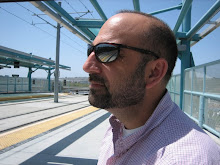One more religious crazy for the Court, yay!
Just what we needed.
Let's have a look at this guy:
Civil Rights and Liberties
For a unanimous panel, denied the weak civil rights claims of a
12-year-old girl who was arrested and handcuffed in a Washington, D.C.,
Metro station for eating a French fry. Roberts noted that "no one is
very happy about the events that led to this litigation" and that the
Metro authority had changed the policy that led to her arrest.
(Hedgepeth v. Washington Metropolitan Area Transit Authority, 2004)
Separation of Church and State
For Bush I, co-authored a friend-of-the-court brief arguing that public
high-school graduation programs could include religious ceremonies. The
Supreme Court disagreed by a vote of 5-4. (Lee v. Weisman, 1992)
Environmental Protection and Property Rights
Voted for rehearing in a case about whether a developer had to take
down a fence so that the arroyo toad could move freely through its
habitat. Roberts argued that the panel was wrong to rule against the
developer because the regulations on behalf of the toad, promulgated
under the Endangered Species Act, overstepped the federal government's
power to regulate interstate commerce. At the end of his opinion,
Roberts suggested that rehearing would allow the court to "consider
alternative grounds" for protecting the toad that are "more consistent
with Supreme Court precedent." (Rancho Viejo v. Nortion, 2003)
For Bush I, argued that environmental groups concerned about mining on
public lands had not proved enough about the impact of the government's
actions to give them standing to sue. The Supreme Court adopted this
argument. (Lujan v. National Wildlife Federation, 1990)
Criminal Law
Joined a unanimous opinion ruling that a police officer who searched
the trunk of a car without saying that he was looking for evidence of a
crime (the standard for constitutionality) still conducted the search
legally, because there was a reasonable basis to think contraband was
in the trunk, regardless of whether the officer was thinking in those
terms. (U.S. v. Brown, 2004)
Habeas Corpus
Joined a unanimous opinion denying the claim of a prisoner who argued
that by tightening parole rules in the middle of his sentence, the
government subjected him to an unconstitutional after-the-fact
punishment. The panel reversed its decision after a Supreme Court
ruling directly contradicted it. (Fletcher v. District of Columbia,
2004)
For Bush I, successfully helped argue that doctors and clinics
receiving federal funds may not talk to patients about abortion. (Rust
v. Sullivan, 1991)
Judicial Philosophy
Concurring in a decision allowing President Bush to halt suits by
Americans against Iraq as the country rebuilds, Roberts called for
deference to the executive and for a literal reading of the relevant
statute. (Acree v. Republic of Iraq, 2004)
Yikes!





No comments:
Post a Comment